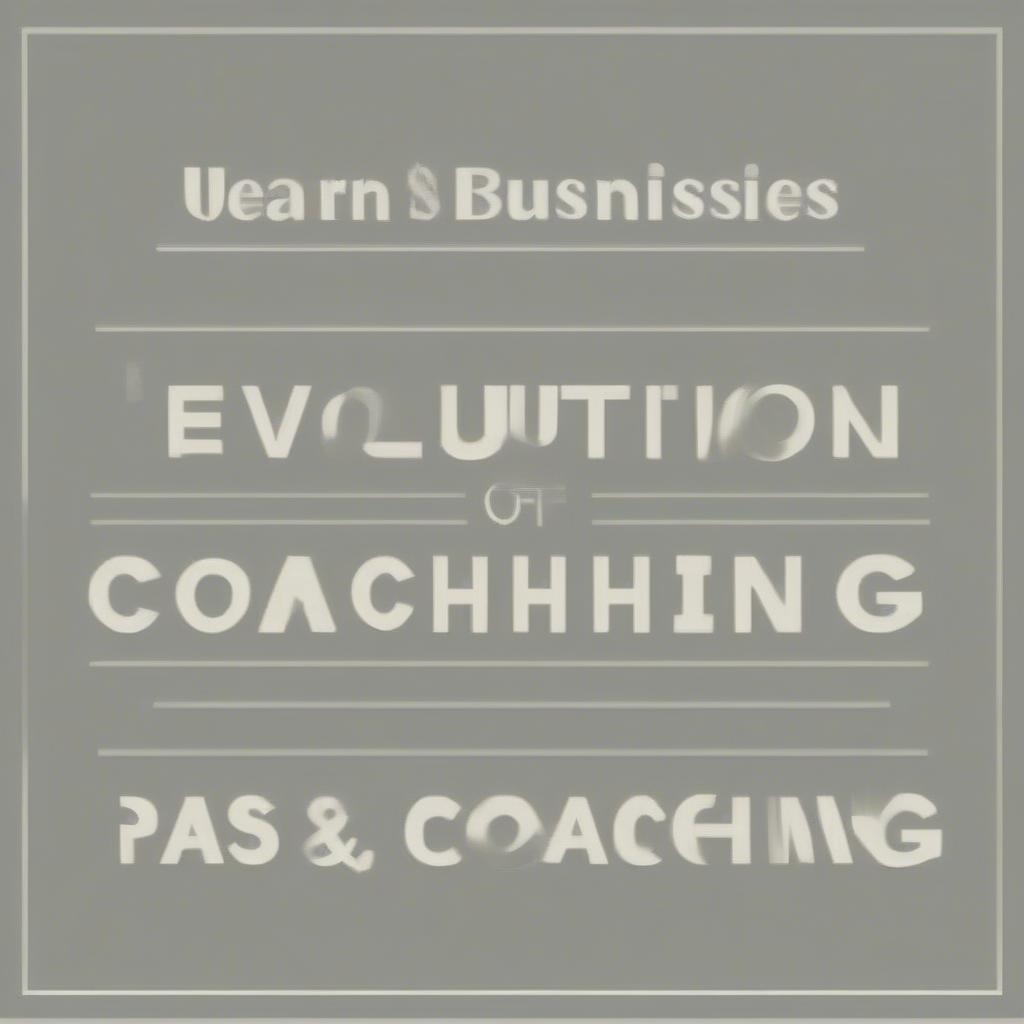
Understanding the Power of a Coaching Niche
The coaching industry, while booming, is also incredibly competitive. Imagine a vast ocean teeming with fish – that’s the coaching market. Now, imagine trying to catch a specific type of fish with a general-purpose net. Your chances are slim, right? That’s where the power of a coaching niche comes in. It’s about honing your expertise, defining your ideal client, and focusing your efforts to achieve remarkable business growth. Instead of trying to be everything to everyone, a specialization allows you to become the go-to expert for a specific group.
What is a Coaching Niche?
A coaching niche is a clearly defined segment of the broader coaching market. It’s a specific area where you focus your skills, knowledge, and expertise. This could be based on:
- Target Audience: Focusing on a specific demographic or profession, such as coaching for female entrepreneurs, executive leaders, or creative professionals.
- Specific Problem or Challenge: Addressing a particular issue, like overcoming imposter syndrome, improving time management, or enhancing communication skills.
- Desired Outcome: Concentrating on a particular result, such as helping clients achieve financial freedom, build a successful business, or find fulfilling careers.
Why a Niche is Essential for Coaching Business Growth
Trying to be a "general" coach is like trying to master every instrument in an orchestra – it’s nearly impossible and often ineffective. Here’s why a coaching niche is crucial for business growth:
- Reduced Competition: Rather than competing with thousands of general coaches, you become a specialist within a smaller, more manageable market.
- Attract Ideal Clients: Your message becomes clearer and more resonant to the specific group you aim to serve. They recognize you as the expert they need.
- Increased Credibility: Clients trust specialists. Your deep knowledge and experience in a particular area establish you as a leader.
- Higher Prices: With specialized expertise, you can charge premium rates for your services, as clients are willing to pay more for a specific solution.
- Efficient Marketing: Your marketing efforts become more focused and cost-effective, targeting only the clients you want to attract.
- Clearer Messaging: A niche allows you to create more specific and compelling marketing material, directly addressing your ideal client’s pain points and desires.
- Enhanced Client Results: Your deeper understanding of your niche’s challenges allows you to deliver more tailored, effective solutions, leading to happier, more successful clients.
- Sustainable Growth: A niche builds a strong foundation for scalable and long-term business growth, as your reputation within your area solidifies.
How to Identify Your Ideal Coaching Niche
Choosing the right coaching niche is a critical step in ensuring your success. It’s about aligning your passions, skills, and market demand to find the sweet spot where you can truly shine.
Step 1: Self-Reflection – Passion, Skills, and Experience
Before looking outwards, start by looking inwards:
- Identify Your Passions: What are you genuinely interested in? What topics excite you? Coaching is demanding, and passion will fuel your long-term commitment.
- Assess Your Skills: What are you naturally good at? What skills have you developed over time? This could be anything from communication and listening to problem-solving and strategic thinking.
- Analyze Your Experience: What kind of jobs have you held, and what challenges did you overcome? What areas of expertise have you accumulated over the years? Your personal experiences can often lead to unique niches.
- Consider Your Natural Strengths: What comes easily to you? What do people often compliment you on?
Example Reflection Questions:
- What do I enjoy learning about in my free time?
- What do friends and family ask me for help with?
- What challenges have I successfully navigated in my own life?
- What areas do I feel confident teaching others?
- What impact do I want to have on the world?
Step 2: Market Research – Identifying Needs and Opportunities
Once you have a better understanding of yourself, it’s time to research the market:
- Identify Trends: What’s trending in the coaching industry? Are there any emerging fields or growing needs?
- Research Specific Niches: Look at existing coaches and what they are offering. What niches are underserved? What gaps can you fill?
- Analyze Competition: Don’t be afraid of competition; it can indicate demand. Just make sure you can offer a unique perspective or value.
- Talk to Potential Clients: Reach out to people in your potential niches and ask them about their challenges and needs. This will help validate your ideas.
- Keyword Research: Use tools like Google Keyword Planner to see what keywords related to your niche are being searched. This will help determine if there’s interest in your chosen area.
Example Market Research Questions:
- What are common pain points in a specific industry or demographic?
- What are the unmet needs in the coaching market?
- Are there any emerging trends that align with my skills and passions?
- What are people searching for online regarding coaching?
- Who are my potential clients, and where do they hang out online?
Step 3: Refining and Validating Your Niche
After your self-reflection and market research, refine your niche:
- Combine Passion and Market Demand: Find the overlap between what you love and what the market needs. This is your sweet spot.
- Test Your Niche: Offer free or low-cost coaching sessions in your chosen niche to see if it’s a good fit for you and if there is real demand.
- Gather Feedback: Ask your initial clients for feedback to help fine-tune your services and message.
- Iterate: Don’t be afraid to refine or even pivot your niche based on the results you see. It’s an ongoing process.
Example Niche Validation Steps:
- Offer 3-5 free coaching sessions to target individuals.
- Request written feedback from these individuals.
- Analyze common themes and challenges arising from the feedback.
- Refine your niche message to better speak to the core issues.
- Adjust pricing and service packages based on feedback and market analysis.
Building Your Brand as a Niche Expert
Once you’ve identified your coaching niche, the next step is to build your brand as a go-to expert:
1. Craft a Powerful Brand Message
Your message should clearly communicate your expertise and the unique benefits you offer:
- Define your Unique Value Proposition (UVP): What makes you different from other coaches in your niche?
- Use Clear and Concise Language: Avoid jargon and speak directly to your ideal client.
- Focus on Outcomes: Highlight the results your clients can expect to achieve.
Example Messaging Framework:
- "I help [Target Audience] achieve [Desired Outcome] by [Your Unique Approach]."
- "Are you struggling with [Specific Problem]? I can help you [Solution/Outcome]."
- "As a specialist in [Your Niche], I offer [Unique Benefit] to [Target Audience]."
2. Create Niche-Specific Content
Content is king! Creating valuable, niche-specific content is key to attracting your ideal clients:
- Blog Posts: Write articles addressing specific challenges and needs within your niche. Use relevant keywords for SEO.
- Videos: Create video content like tutorials, case studies, and behind-the-scenes looks.
- Podcasts: Host a podcast discussing topics related to your niche and featuring guest experts.
- Social Media: Share content regularly on social media platforms relevant to your target audience.
- Free Resources: Offer valuable free resources like e-books, checklists, or templates to capture leads.
3. Build Your Online Presence
Establish a professional online presence to increase your visibility:
- Website: Create a professional website that clearly communicates your brand and services. Make sure your website is optimized for search engines.
- Social Media: Choose 1-2 social media platforms where your ideal clients hang out and focus your efforts there.
- Online Directories: List your coaching practice on relevant online directories.
- Guest Blogging/Podcasting: Contribute to other relevant platforms to reach new audiences.
4. Network with Other Experts
Building relationships with other professionals can help grow your practice:
- Attend Industry Events: Participate in virtual or in-person events related to your niche.
- Collaborate with Complementary Businesses: Partner with businesses that serve your target audience but offer different services.
- Join Online Communities: Engage in online communities and forums where your ideal clients gather.
5. Gather Testimonials and Case Studies
Social proof is incredibly powerful. Collect testimonials from happy clients to build credibility:
- Ask for Testimonials: Encourage your clients to share their positive experiences with you.
- Create Case Studies: Showcase how you’ve helped other clients achieve specific results.
- Feature Social Proof Prominently: Display testimonials on your website and in your marketing materials.
Practical Strategies for Niche Growth
Now that you understand the theory, let’s dive into practical strategies to grow your coaching practice within your chosen specialization:
1. The “Client Avatar” Deep Dive
To maximize your reach, you need to know your client intimately:
- Demographics: Age, gender, income, location, education
- Psychographics: Values, beliefs, attitudes, fears, aspirations
- Pain Points: What are their biggest challenges? What keeps them up at night?
- Goals: What do they ultimately want to achieve? What does success look like for them?
- Preferred Communication: How do they like to learn and engage? Where do they hang out online?
Client Avatar Template Example:
- Name: Sarah
- Age: 35
- Profession: Marketing Manager
- Pain Point: Feeling overwhelmed and lacking work-life balance
- Goal: Achieve a successful career while having a fulfilling personal life
- Learning Style: Prefers visual content, loves podcasts, actively engaged on LinkedIn
2. Creating a Niche-Specific Coaching Program
Design a coaching program that directly addresses the needs of your ideal client:
- Clearly Defined Modules: Break your program into logical, step-by-step modules.
- Actionable Steps: Include exercises, templates, and tools to help clients apply what they learn.
- Personalized Support: Provide individual or group coaching to help clients overcome challenges.
- Measurable Outcomes: Establish metrics to track progress and celebrate success.
- Offer Various Packages: Provide different options to meet various needs and budgets.
Example Program Structure:
- Module 1: Understanding Time Management Challenges
- Module 2: Identifying Personal Time Wasters
- Module 3: Implementing Effective Planning Strategies
- Module 4: Prioritization Techniques for Improved Focus
- Module 5: Maintaining Balance and Managing Stress
3. Leverage the Power of Content Marketing
Content marketing is essential for attracting your target audience and establishing yourself as a leader:
- Keyword Research: Identify the keywords and phrases your ideal clients use when searching online.
- Blog Regularly: Create valuable, keyword-rich blog posts that address your client’s challenges.
- Create Engaging Videos: Develop video content that delivers insights and inspires action.
- Utilize Social Media: Share your content on relevant platforms and engage with your followers.
- Offer Opt-Ins: Provide free resources in exchange for email addresses to build your email list.
- Utilize SEO Optimization: Ensure your content is optimized for search engines using relevant keywords and phrases.
4. Harness the Power of Community Building
Creating a sense of community can amplify your impact and grow your coaching practice:
- Facebook Groups: Create a private Facebook group for your clients or prospects.
- Online Forums: Participate in industry-related forums and discussions.
- Host Webinars and Workshops: Gather your target audience and provide valuable content.
- Create a Supportive Environment: Encourage interaction and networking among members.
The Role of Learn Business in Your Coaching Growth Journey
As a coach, you’re likely focused on helping your clients thrive. However, running your own business requires a different set of skills, and this is where Learn Business steps in. We understand the unique challenges faced by coaches and provide tailored support to help you grow your practice effectively.
How Learn Business Supports Your Coaching Practice
Learn Business provides resources and templates to help you:
- Streamline Your Business Processes: Access templates for client contracts, onboarding, and offboarding, saving you valuable time.
- Improve Your Sales and Marketing: Use ready-made templates for crafting sales pages, email sequences, and social media content.
- Clarify Your Finances: Utilize financial templates to track income and expenses, ensuring your business is profitable.
- Boost Efficiency: Access project management templates that allow you to better organise and track your projects and goals.
- Plan Strategic Growth: Use our strategic planning templates to develop effective growth strategies.
Leveraging Learn Business Templates for Niche Success
Here are some practical ways you can leverage Learn Business templates to enhance your niche expertise:
- Customizing Client Onboarding: Use Learn Business’s client onboarding template to create a seamless experience for your clients, reinforcing your professionalism and specialization.
- Developing Targeted Marketing Campaigns: Use our marketing templates to craft niche-specific content and campaigns that resonate with your ideal client.
- Financial Planning: Use our financial templates to develop a clear picture of your business finances. This allows you to determine if your niche is truly profitable.
- Project Management: Use project management templates to organise and track all your tasks that align with your business growth.
- Strategic Plan: Leverage strategic planning templates to make informed and effective plans to grow your coaching practice within your chosen niche.
By utilizing the ready-to-use templates provided by Learn Business, you can streamline many aspects of your business, enabling you to spend more time focusing on your clients and growing your business.
Conclusion
In the competitive coaching landscape, specializing is not just an advantage; it’s a necessity for sustainable business growth. By identifying a clear coaching niche that aligns with your passion and skills, conducting thorough market research, crafting a powerful brand message, creating valuable content, and consistently networking, you can position yourself as the go-to expert for your ideal clients. Remember, the journey to specialization may seem challenging, but the rewards – increased credibility, higher prices, and attracting the right clients – are well worth the effort. With the right strategies and resources, such as those offered by Learn Business, your coaching practice can thrive and reach its full potential. Embrace the power of a niche, and watch your business growth soar!



Leave a Reply